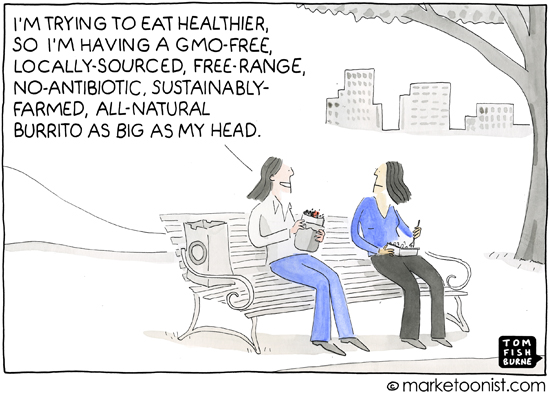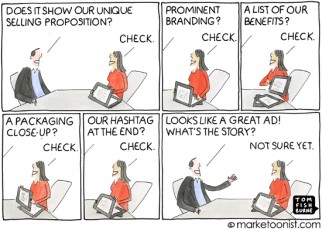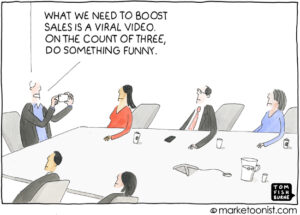It’s a tricky time to be a food marketer. How consumers define what it means to be “healthy” is in flux. As a food marketing friend pointed out, consumers are increasingly prioritizing food purity over calorie count.
Chipotle is the poster brand for the current state of health positioning. They’re taking a leadership role in progressive stances like GMO-free and sustainable sourcing. And this obscures the fact that an average meal at Chipotle packs a whopping 1,070 calories, close to a full day’s worth of salt, and 75% of a day’s worth of saturated fat. A Chipotle burrito has more than double the calories, cholesterol, and grams of fat than a Taco Bell Supreme Beef Burrito.
It’s similar to soda makers that tout being “made with real cane sugar” or granola bars that are really glorified candy bars. There’s an aura of health that distracts from the actual nutritional picture. Researchers refer to this as a “health halo.”
Meanwhile, traditional diet brands like Lean Cuisine, Diet Coke, and Special K have been struggling.
It will be interesting to see how consumers continue to evaluate brands that are perceived as healthy. I’d love to hear your thoughts on how food brands should navigate this constantly changing environment of what defines healthy. There’s a fine line between a health halo and health washing.
It reminds of this cartoon I drew in 2007 on the art of green washing.




Melissa says
This is a very interesting time in food marketing for sure. What seems to be the bigger concern is really about public education about nutrition; an issue that goes even further to affect even the pet food industry (see the many lawsuits that Blue Buffalo has lost over false/misleading advertising in the last couple of years). Chipotle’s in a prime example: we are GMO-free! Ok – but what does that mean? All that assumes is that GMO foods are bad and therefore GMO-free foods are good and Chiptole’s somehow is now “healthy”. This is of course not true – GMO foods are nutritionally equal (and far more extensively tested for quality and safety) as their conventionally grown counterparts. And as your example states, Chipotle’s menu offerings are not healthy. But, as long as companies are willing to pray on consumer fears and misconceptions about agriculture and nutrition this problem will continue, if not get worse. As a marketer, I feel it is part of my job to inform and make sure that consumers are not mislead in the name of sales – this is what ethical marketing is. However, if food marketers continue to misrepresent the facts and take advantage of consumer fears to increase sales I fear that we, as a profession, truly live up to the reputation of “sneaky” and “saying whatever will get a sale” and not how I view marketing – ensuring the right products, get to the right people at the right time for the benefit of the consumer.
Jennifer Nelson says
After you created this, did you find yourself exclaiming a little understated “nailed it.” 🙂 ?
I have also seen that consumer sentiment on these issues is also (less so, but still perceptibly) intertwined with their perception of the brand or companies social issues stance(s).
Oh it’s a challenging time to navigate these waters!
Tracy Carlson says
Great cartoon and post! Food marketing is certainly tricky, and undoubtedly getting trickier. One of the underlying issues here, though, is brand vs. product, which is ultimately a long-term vs. short-term play. Chipotle is building its brand by being seen as a good-guy through its sourcing and use of fresh ingredients, among other things. Because of this, people are at least a bit less likely to look as closely at its products. On the other hand, ingredient stories come and go, and these primarily affect products: good-guy ingredients are swiftly added (remember oat brand donuts?) to capitalize on a fad, and bad-guy ingredients are removed. In the case of Diet Coke, Lean Cuisine and Special K, I’d argue that their products are more vulnerable to changing times because the brands themselves don’t really stand for anything substantive, and there’s no larger good-guy corporate story (in some cases, far from it!) that can help offset the larger move away from highly processed products. Should be interesting to watch!
Jean Storlie says
Great cartoon and article! As health perceptions evolve, consumers have become more emotional about food messages and immune to the facts. You really captured this phenomenon in your cartoon. Perhaps the opportunity is to find emotionally relevant ways to convey the hard cold facts. Welcome to my world as a dietitian and health strategy consultant!
Jordan Kayloe says
Coincidentally, my wife found this related article yesterday:
http://www.washingtonpost.com/news/volokh-conspiracy/wp/2015/01/17/over-80-percent-of-americans-support-mandatory-labels-on-foods-containing-dna/?tid=pm_national_pop_b
Long story short, 80% of people polled thought this “warning” should be included on food labels:
WARNING: This product contains deoxyribonucleic acid (DNA). The Surgeon General has determined that DNA is linked to a variety of diseases in both animals and humans. In some configurations, it is a risk factor for cancer and heart disease. Pregnant women are at very high risk of passing on DNA to their children.
Seth Grimes says
Statements such as “GMO foods are nutritionally equal” miss half the story, a half that is only hinted at in references to “GMO-free and sustainable sourcing.” Many/most food GMOs are designed not to be susceptible to pesticides (herbicides) such as glyphosate. They are designed to allow growers to liberally apply pesticides, and that’s not good for the ecosystem or for consumers. Further, some GMOs are designed, patented, and licensed to disallow growers from saving seeds for planting during a following season, which transforms food growing into an intellectual property battlefield. There are many dimensions to health — economic, social, environmental — beyond the immediate impact of the foods you put in your body.
Melissa says
@Seth Grimes – this is exactly what I was referring to; not only is your information incorrect (GMO crops are actually designed to use less resources including pesticides), it is assuming that organic or conventionally grown crops use LESS pesticides which again is untrue. I am not trying to start a debate about agriculture, so I am ending it here. But, my point is that as marketers we need to ensure that we are fact-checking and making sure that the claims we make are accurate. That, to me, is what ethical marketing is all about. If something is marketed as “healthy” it should have high nutritional value, not just sourcing/quality/etc claims that are hot topics in the minds of consumers.
Diane says
Can we brand “reduced portion size”?
We eat too much.